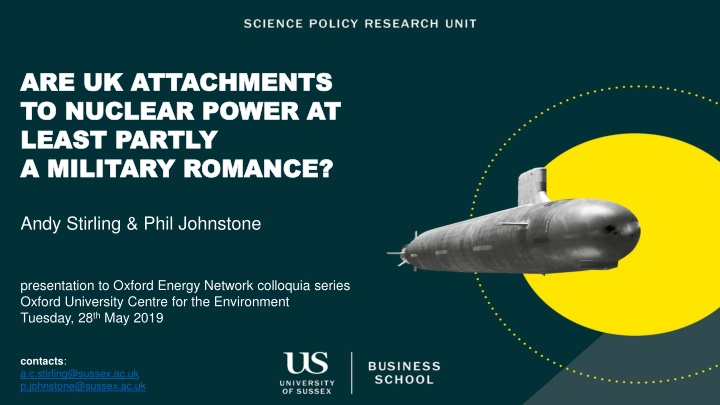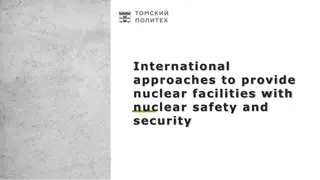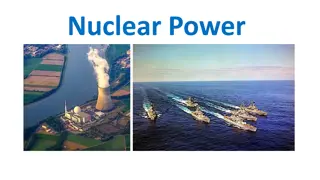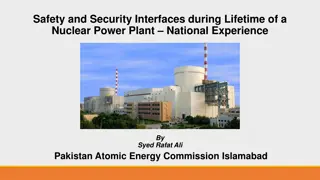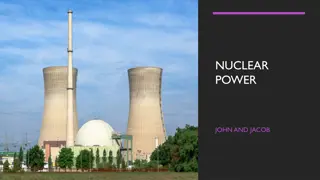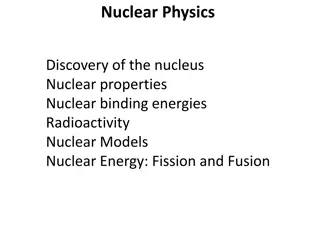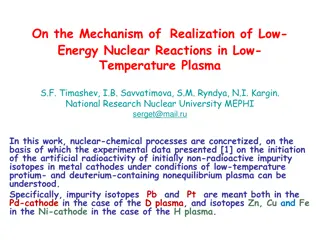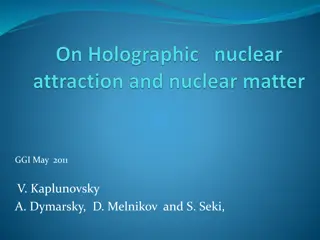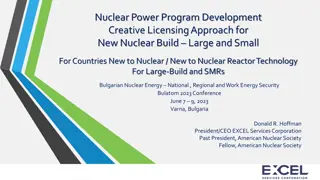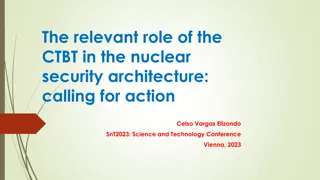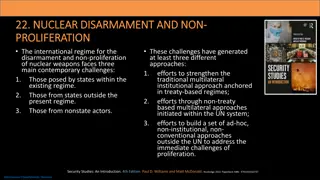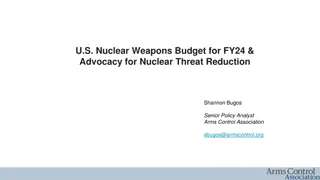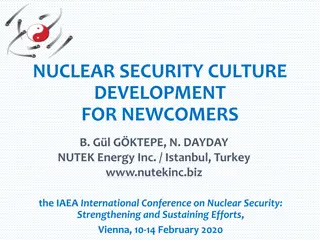Unveiling the Military Links to UK's Civil Nuclear Power Attachments
Explore the potential military ties behind the UK government's strong support for civil nuclear power, questioning if consumer-funded nuclear infrastructures aid military endeavors. The growing costs and declining competitiveness of nuclear power are under scrutiny, highlighting a significant subsidy from UK electricity consumers towards the national nuclear military infrastructure, impacting household bills.
Download Presentation

Please find below an Image/Link to download the presentation.
The content on the website is provided AS IS for your information and personal use only. It may not be sold, licensed, or shared on other websites without obtaining consent from the author.If you encounter any issues during the download, it is possible that the publisher has removed the file from their server.
You are allowed to download the files provided on this website for personal or commercial use, subject to the condition that they are used lawfully. All files are the property of their respective owners.
The content on the website is provided AS IS for your information and personal use only. It may not be sold, licensed, or shared on other websites without obtaining consent from the author.
E N D
Presentation Transcript
ARE UK ATTACHMENTS ARE UK ATTACHMENTS TO NUCLEAR POWER AT TO NUCLEAR POWER AT LEAST PARTLY LEAST PARTLY A A MILITARY ROMANCE MILITARY ROMANCE? ? Andy Stirling & Phil Johnstone presentation to Oxford Energy Network colloquia series Oxford University Centre for the Environment Tuesday, 28th May 2019 contacts: a.c.stirling@sussex.ac.uk p.johnstone@sussex.ac.uk
What is at stake? Submerged drivers in energy policy? What is in question here, is whether a large part of the rationale for intense UK Government attachments to civil nuclear power are due to entirely-undeclared military nuclear interests? In particular, it is clear both in the UK and beyond, that the costs of maintaining nuclear submarine capabilities are insupportable without parallel consumer-funded civil nuclear infrastructures. Major long-run global trends in accelerating competitiveness of renewable energy and declining viability of nuclear power, are making this continuing dependency increasingly difficult to conceal. So, the specific hypothesis analysed here, is not that nuclear military interests are sole drivers of otherwise-unjustified levels of UK support for civil nuclear power, but that they are a major factor. The costs of this military cross-dependency are largely un-interrogated. But NAO figures suggest the magnitude of the economic stakes are of a minimum order of many tens of billions of pounds. What is in focus in effect, then, is a large de facto subsidy from UK electricity consumers towards the national nuclear military infrastructure of an order amounting at least to 7% on household bills.
Some background issues (this is not a pro/anti debate) There is no part of this analysis that necessarily attests to any lack of integrity or breach of good faith (let alone conspiracy )on part of any individuals or agencies involved in this complex affair. Intense political and economic forces and routine levels of secrecy can be sufficient in themselves to condition this kind of evident large scale failing in policy rigour and democratic accountability. Nor should acceptance of the seriousness of these questions be seen necessarily to imply a more generally critical position on nuclear power. The core issue is simply a matter of good governance. Indeed, it is even more important under views favourable to nuclear power, that promotional efforts do not provoke a counter-productive backlash by breaching qualities of good governance. As for the authors position on nuclear, that some of our work has been critical is not a sign of an in-principle anti-nuclear position. To brand criticism this way is itself a sign of partisan irrationality. The scale of the evident diversion of resources, the secrecy, and the lack of Parliamentary, policy and wider media scrutiny, mean the most crucial issue here is about the health of UK democracy.
Renewables are overtaking nuclear (but supported less) UK Government data confirms that UK renewables are already available at approaching half the cost of nuclear power. Globally, renewable costs are falling rapidly and nuclear costs are growing. Even ignoring nuclear drawbacks; emerging consensus (eg: NIC; ETC; Ofgem; UKERC; NGC) is that: baseload outdated ; intermittency costs small fraction of an already-large renewable advantage Key choices are political, but no technical reason why UK could not have a more affordable, secure and diverse electricity system from 100% renewables, more quickly than current nuclear programme. Yet UK Government support is strongly biased towards nuclear: favourable 35-year contracts; grid codes; loan guarantees; public investment; liability cover; reduced insurance; waste management. UK nuclear research funding is 12 times more than for renewables; subsidies larger despite greater nuclear maturity; tidal projects are cancelled; cheapest power (onshore wind) is effectively banned. UK nuclear jobs and skills loudly advocated, often without referring to already-larger volumes of skilled renewable jobs; and massively greater export growth potential in global renewable markets
Official UK nuclear support is extraordinarily intense Since 2006, UK plans for a "nuclear renaissance involve nuclear new-build commitments that are exceptional in Europe (and in proportion to the size of the UK system), largest in the world Tony Blair set tone (2006): repudiates critical white paper; convenes secret Cabinet process; rejects judicial quashing of less detailed pro-nuclear successor: nuclear power is back with a vengeance Chief Scientist Sir David King (2006) illustrates erroneous terms of support: we have no alternative to nuclear power: if there were other sources of low carbon energy I would be in favour, but there aren't Energy Minister Amber Rudd conveys same continuing unusually blinkered and exclusive mood a decade later (2016): nuclear power is what this Government is all about for the next twenty years Stark contrast with Germany: world s leading nuclear engineering exporter; most successful high- technology economy; far less attractive renewable resource; confirms nuclear phase-out (2011) Globally, a precipitous decline in nuclear power and massive swing to renewables, with capital investment in renewable electricity generation since 2013 exceeding all other forms put together
Military rationales are openly declared in other countries In the few countries where nuclear support persists, key reason is military Russian military priorities for civil nuclear industry: [r]eliable provision of Russia s defense capability is the main priority of the nuclear industry [Rosatom 2017] France one expert dares the ultimate question: What about the credibility of our deterrent force and our position at the UN if France gives up its power plants? [Le Monde, 2017] France report that embarrassed Nicolas Hulot expresses concern for civil as well as defense activities with nuclear propulsion of submarines and aircraft carriers [Les Echos, 2018] Brazil President Dilma Rousseff (2014): the Brazilian Navy have contributed decisively to our nation, towards our country joining the select group of five member countries of the United Nations Security Council, which dominate the nuclear propelled submarine technology US military priorities for civil nuclear industry: abandonment of civil nuclear will stunt development of the nation s defense nuclear complex [NEI 2016]
Military rationales are openly declared in other countries Despite less acute difficulties, civil-military links are loudly debated in US Former US Energy Secretary emphasises needs of the nuclear Navy : a strong domestic supply chain is needed to provide for nuclear Navy requirements. This supply chain has an inherent and very strong overlap with the commercial nuclear energy [Moniz 2017] Lobbying by US military and industry leaders: Several national security organizations, including our nuclear Navy and significant parts of the Department of Energy [DOE], benefit from a strong civil nuclear sector. Many of the companies that serve the civil nuclear sector also supply the nuclear Navy and major DOE programs [Akerson 2018] Leaked confidential US Government Memorandum: Our national security also relies on a robust civilian nuclear power industry to support the entire US nuclear enterprise and US nuclear leadership abroad [USG 2018] US Senator Jeff Duncan (R-SC): "nuclear energy is critical to national security" "US Navy benefits from a shared supply chain with the civilian nuclear fleet The Navy and civilian nuclear plants also share workforces, with civilian plants offering great paying jobs to veterans (The Hill, 2019)
Broad international patterns confirm civil-military links The leading global military powers are the most committed to large scale new nuclear build There is no global or regional military power that does not hold an active history of very strong pressures for civil nuclear power No country either with or planning nuclear weapons or submarines is currently pursuing either a nuclear moratorium or a phase-out
UK military policy debates show clear civil-military links RAEng (2009): skills required in the design, build, operation and disposal of [naval nuclear reactors] are in short supply and increasingly expensive decline of civil nuclear programme has forced nuclear submarine programme, to develop and fund its own expertise to remain operational Skills synergies (Rolls Royce 2009): Skills are considered to be transferable between military propulsion and civil programmes a larger involvement in the broader industry will also have a spillover benefit to military capability through skill development and experience exchange Dalton Institute: UK is not now in the position of having financial or personnel resources to develop both programmes in isolation leads to conclusion that links between the civil and naval sector need to be encouraged Nuclear union worries (KOFAC 2010): the decline of the UK civil nuclear programme has forced the military nuclear programme, and in particular the nuclear submarine programme, to develop and fund its own expertise and personnel in order to remain operational Industry pressure (Rolls Royce 2017) for nuclear military subsidy to relieve the [Defence] Ministry of the burden of developing and retaining skills and capability on the military side
Official UK defence sources confirm important links Crisis in military nuclear skills: Across the enterprise the availability of deep specialist expertise in key and suitably qualified staff appears to be at the bare minimum necessary to deliver the programme [MoD 2014 redacted FOI by Rob Edwards] Crisis in research capabilities: the MOD's programme had been underwritten by civil nuclear research that has over the years been dismantled and commercialised expertise in these activities generated has atrophied. [MoD 2014 redacted FOI by Rob Edwards] Government response: that the programme seek imaginative methods to better engage with the emergent civil new-build programme on nuclear matters to the benefit of defence ; [that] the Research Programme Group establish a workstrand to look at leveraging to maximum effect civil nuclear investment ; [and that] MOD revisit the possible option of utilising other nuclear facilities including those in the civil sector [MoD 2014 redacted FOI by Rob Edwards] Logic of Nuclear Sector Deal: committed to increasing the opportunities for transferability between civil and defense industries and generally increasing mobility to ensure resources are positioned at required locations [NIC 2017]
UK energy debates display oddly contrasting silence Oxford Economics Government consulting report (2013): naval and civil reactor industries are often viewed as separate and to some extent unrelated ... However, the timeline of the UK nuclear industry has clear interactions between the two, particularly from a supply chain development point of view Dalton Nuclear Research Institute: this link does however need to be carefully managed to avoid the perception that civil and military nuclear programmes are one and the same BAE Systems executive in report for RUSI (2007): nuclear submarines suffer criticism because their through-life costs cannot be absorbed or masked by other programmes as can be the case with fast jets or large standing land forces Questioned in 2017 by PAC, MoD Perm. Sec. (and lead civil nuclear contract negotiator) confirms: We are completing the build of the nuclear submarines so there is very definitely an opportunity here for the nation to grasp in terms of building up its nuclear skills. I do not think that that is going to happen by accident; it is going to require concerted Government action to make it happen BEIS Under-Secretary of State, Richard Harrington MP (2018): I want to include the MOD more in everything we do it is time that that [the]artificial distinction [between civil and military nuclear] came to an end, and I will do my absolute best to bring that about
Public NAO analysis strongly hints at major links 2017: NAO note that consumers have been locked in to a risky and expensive deal on Hinkley Point C partly by other strategic considerations, beyond the officially-stated energy trilemma Criticising under-justification of the nuclear case, NAO note in 2017 that Government has not formally reviewed and consulted on its published strategic case for nuclear power since [2008] Also in 2017, NAO calculate top-up payments for Hinkley Point C alone to amount at least to 30 billion. This excludes many other comparably-costly aspects of UK support for civil nuclear power The last NAO report on the submarine programme notes in 2008 that [o]ne assumption is that the [UK] submarine industry will be sustainable and that the costs of supporting it will not fall directly on the future deterrent programme . Where these costs are expected to fall is not stated Even without large amount of additional evidence discussed here, the NAO analysis is consistent with existence of important dependencies between UK civil and military nuclear commitments
The self-justifying circularity in UK nuclear logic Speech by UK Business Secretary Greg Clark MP After the Trilemma 4 principles for the power sector 15th November 2018 "There has been some criticism of the prospective cost of the Hinkley project, but one aspect of the benefit that has not been emphasised often enough is that it restarts programme of civil nuclear power in this country and conversely the loss of much of the supply chain and the domestic skills in the civil nuclear sector was a set back which could have been avoided if we d thought ahead. We need to have a supply chain that is active engineers who understand the technology, PhDs and university departments specialised in it, welders, civil engineers, concrete pourers, and more We ve had to restart our civil nuclear industry more or less from scratch, and doing so has bought us an opportunity to meet our climate targets over the longer-term at lowest cost" ie: a costly option is justified, as a way to preserve the supply chain for that same costly option! This is either irrationally circular or disturbingly clear in undemocratically concealing other reasons.
The bottom line: a hidden UK military nuclear subsidy Costs of UK nuclear submarine capabilities are insupportable without civil nuclear infrastructures Strong UK Government support for civil nuclear power at least partly reflects military interests Similar picture is visible worldwide and officially acknowledged in USA (where pressures are less) Very strong evidence in UK Defence policy for intensity of these pressures to mask military costs But UK energy policy documents (and wider debates) have left these pressures effectively hidden Accelerating competitiveness of renewable energy is now making this impossible to conceal NAO shows excess cost of nuclear support is at least of order of many tens of billions of pounds Hidden military subsidy from UK electricity consumers at least of order of +7% on household bills Secrecy means that implications for quality of UK democracy are just as crucial as energy or costs
